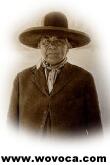|
||||||||||||||||||
Press CTRL+D to bookmark this page! |
||||||||||||||||||
 |
||||||||||||||||||
| Click here for
EarthMotherCrying Wallpaper |
||||||||||||||||||
Prophet of the Nations |
||||||||||||||||||
|
||||||||||||||||||
|
||||||||||||||||||
|
|
||||||||||||||||||
|
||||||||||||||||||
|
||||||||||||||||||
While the Bible designates him clearly as a "kosem"--a sorcerer or
soothsayer--there exists a widespread tradition, found most frequently in
the Midrash, that classifies him as a prophet--in fact, as one of the greatest
prophets, whose abilities rivaled those of Moses himself!
The commentaries have indulged in considerable speculation about how Balaam
went about his work. The Midrash, for instance, relates that he possessed
a talent for discerning when circumstances would be favourably or inauspiciously
disposed towards human undertakings, thereby allowing him to influence a
project's outcome by scheduling it at a particular moment. In this way his
curses and blessings acquired a reputation for effectiveness.
Rabbi Abraham Ibn Ezra, ever an enthusiast of astrology, attributed Balaam's
reputation to his skill reading the stars. Once the horoscope had determined
that a catastrophe was about to occur, Balaam would ceremoniously proclaim
a curse, creating the fraudulent impression that his malediction had actually
caused the disaster.
The 13th-Century commentator Rabbi Bahya ben Asher asked why, if Balaam's
blessings and curses were completely fraudulent and could not truly affect
the destiny of the Israelites, did God take such elaborate measures to discredit
him and demonstrate the baselessness of his oracles? Let Balaam stand and
curse all day! In the long run it won't make any difference.
The answer to this question can be better understood if we realize that the
outcome of human actions is not predetermined. As Ibn Ezra suggested, matters
could take a course that might mistakenly be perceived as a corroboration
of Balaam's curses. It was in order to prevent such a misunderstanding that
God took the trouble to discredit Balaam and demonstrate the patent falseness
of his pretensions.
Most of the commentators accept some variation on the view that Balaam's
sorcery consisted of an insight into future developments. And yet many of
these same commentators are equally insistent that Balaam did not qualify
as a real navi.
Now these interpretations may strike us as puzzling. Are not insights into
the future precisely what defines true prophecy? Were not the great prophets
of the Bible famous for their knowledge of the divine plans for future history?
Actually, this perception of prophecy is a misleading one, widespread though
it may be. It derives largely from alien influences.
In reality the English word "prophet" is not an accurate translation of the
Hebrew navi. Whereas the Hebrew term comes from a root meaning to
speak or proclaim, the English one originates in a Greek word denoting the
prediction of the future. The concept of Greek prophecy reflects a very different
religious culture, in which oracles foretold coming events, and had
scant interest in moral instruction.
This is definitely not the case among the Hebrew prophets. The Nevi'im
were not concerned with revealing the course of future events. Their messages
were invariably aimed at the here-and-now, to proclaim God's word to their
contemporaries.
While it is true that several of the prophets do make declarations about
what will befall Israel in days to come, about impending conquests or about
the Messianic restoration--these matters are never the principal concern
of the message. Rather, they are intended to indicate the consequences of
disobedience and moral laxity, or the rewards in store for those who maintain
their devotion under conditions of adversity. Except perhaps in the most
general of terms, none of these "prophetic" visions of the future has the
character of an absolute or unalterable scenario. Ultimately, they are all
conditional upon the people's response.
Balaam's predictions about the fates of Edom and Amalek are of an oracular
sort, and the Talmudic Rabbis were quick to distinguish them from the ethical
and compassionate spirit that should direct true Nevu'ah. They were
well aware of how the Christian church in their day was ingeniously transforming
the Hebrew scriptures into a book of coded prophesies and "prefigurations"
that irrefutably heralded the coming of their saviour.
The view that history follows a predictable course is what the Torah ascribes
to the "kosem." Ironically, it is precisely the world-view that in
our society is widely identified with "prophecy," as anyone will appreciate
who has had occasion to listen to the forecasts of Christian televangelists,
Israeli messianic extremists, or those who read the Torah as an elaborate
supernatural word-search puzzle.
Perhaps this is the crucial point that Balaam misunderstood. He thought he
could predict the future by charms or horoscopes, and that this would qualify
him to be counted in the ranks of the prophets.
Yet if, as we have seen, Balaam was the antithesis of a true prophet, then
why do the sages of the Talmud and Midrash refer to him so often as a
"Navi'"? This question was asked by Rabbi Isaac Arama in his Akedat
Yitzhak commentary. He replied by pointing out that Balaam is never referred
to simply as a Navi, but always as the "prophet of the nations."
According to Arama, the Rabbis' purpose was to emphasize the contrast
between the opposed perceptions of prophecy in Israel and among the nations
of the world. For Jews, the prophet is ultimately a moral figure, whose insights
into the future are relevant only insofar as they guide our conduct in the
present. For Balaam, on the other hand, humans are playing out a predetermined
scenario over which our actions can exert no meaningful control or influence.
Seen this way, the career of Balaam comes to embody a fundamental conflict
between the Torah's ideal of nevu'ah and "the prophecy of the nations."
author's e-mail address is
elsegal@ucalgary.ca
|
||||||||||||||||||
|
||||||||||||||||||
|
||||||||||||||||||
|
||||||||||||||||||
Shapeshift to WOVOCA! to view this site's main page |
||||||||||||||||||
|
||||||||||||||||||
|
||||||||||||||||||
|
||||||||||||||||||
|
||||||||||||||||||
|
||||||||||||||||||










![[Image]](pict41.jpg)
![[Image]](pict43.jpg)